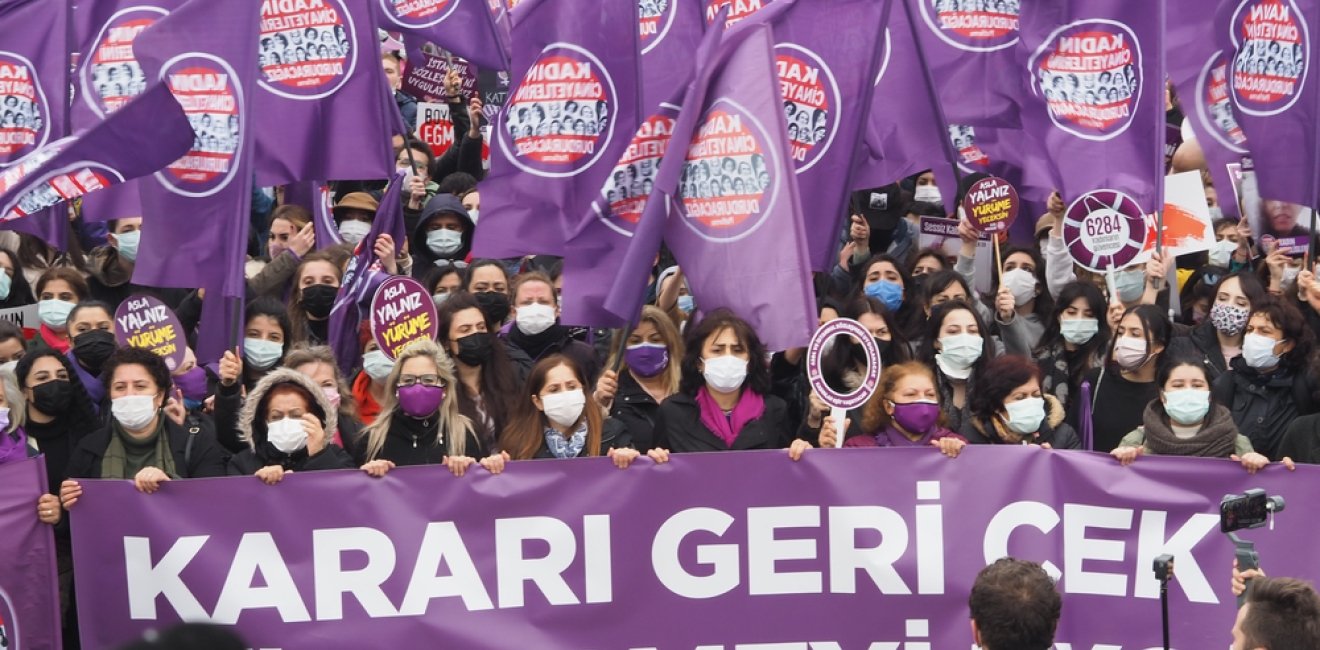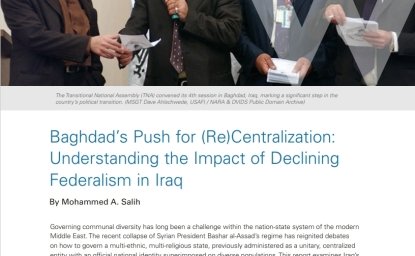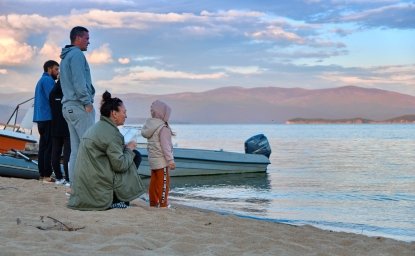Civil society in Turkey today is facing strong headwinds. In a widely criticized decision this April, a court sentenced the philanthropist Osman Kavala to life in prison for his alleged role in the 2013 Gezi Park protests – labeled as terrorist supporter. But this is only the latest in a series of policies putting a chill on civil society.
The law on the Prevention of the Financing of Terrorism, Law No. 7262, was swiftly enacted in 2020 by President Erdogan's Justice and Development Party (AKP) after only two weeks of deliberation in the Turkish Grand National Assembly. This law allows the Minister of the Interior to suspend employees and halt operations of organizations being investigated for terrorism. It also allows the president to freeze the assets of organizations suspected of funding terrorism and requires permission to collect donations online or face administrative fines. Despite its security pretentions, this law can be used for political ends.
High inflation, rising unemployment, devaluation of the currency, and a scarcity of decent-paying jobs are reinvigorating civic action and motivating different social factions to mobilize.
Civic participation in Turkey may not be as robust as many believe, but it is on the rise. High inflation, rising unemployment, devaluation of the currency, and a scarcity of decent-paying jobs are reinvigorating civic action and motivating different social factions to mobilize. In fact, the AKP is preparing to pass a law aiming to punish those who share statistical information unapproved by the Turkish Statistical Institution, an establishment infamous for downplaying inflation rates.
The regulatory and legal pressures facing civil society are only one part of the whole picture. Turkish democracy deteriorated rapidly during the last decade under President Erdogan and the AKP. Excessive concentration of power, a decrease in horizontal and vertical accountability, the spread of corruption, and a decline in civil and political freedoms have caused democratic values and institutions to decay.
From democracy to electoral autocracy
According to the World Justice Project's Rule of Law Index, Turkey ranked only 117 out of 139 countries in 2021. The same year, Turkey's rank on the Global Corruption Index, provided by Transparency International, dropped from 59 to 86 out of 180. President Erdogan began building his regime on a vast network of patrimonial relations, funneling public resources to pro-regime corporations since 2004.
According to V-Dem's Electoral Democracy Score, which grades countries on a 0 - 1 scale, Turkey dropped from 0.55 to 0.28 in the last decade.
In fact, the share of public procurement increased sixfold between 2004 and 2011, and around 85 percent of those deals were awarded to companies that had ties with AKP. These companies gradually acquired 90 to 95 percent of mainstream media to ensure dissent would be silenced and that resources kept flowing. As expected, the decline of critical elements of democracy led Turkey to transform into an electoral autocracy. According to V-Dem's Electoral Democracy Score, which grades countries on a 0 - 1 scale, Turkey dropped from 0.55 to 0.28 in the last decade.
Civil society, an essential means to combat democratic backsliding, has been severely incapacitated by the turn to illiberal governance. Turkey's “exit from democracy” is marked by a systematic violation of the rule of law and freedom of speech and association, sterilizing the political environment for civil society to flourish. Even before the infamous law no. 7262 – aka the “NGO law” – CIVICUS State of Civil Society report published in 2018 categorized Turkey's civil society as 'repressed' alongside Russia, Venezuela, and Afghanistan. According to Amnesty International, there was “an unrelenting clampdown” on independent organizations through counterterrorism laws and other legal means.
President Erdogan’s gradual takeover of mainstream media was partially motivated by criticism arising from civil society, preventing alternative voices from reaching broader constituencies, including AKP supporters. This puts critical civil society actors at risk of getting stuck in their echo chambers. However, emerging movements are helping to bridge these gaps between actors and the wider population. Social media and the economic crisis have become catalysts for mobilizing women, workers, students, the homeless, and gig workers. As such, several emerging non-governmental organizations have caught the government’s attention.
Organizations under pressure
One such NGO, We Will End Femicide, aligns with the historically powerful women’s movement in Turkey. The increase in violence against women, lack of equal pay, and several other forms of discrimination have resulted in a unique alliance between women of all backgrounds. Notably, conservative women, a group that traditionally supported President Erdogan, sympathize with We Will End Femicide, forcing the government to take into account the broader demands of women. That does not mean the government welcomes the women's movement with open arms; the authorities routinely crack down on women's day marches with police suppression and arbitrary lawsuits.
In 2020, a lawsuit targeted We Will End Femicide after six of its members conducted a peaceful demonstration in Istanbul. More recently, on April 13, 2022, the Istanbul Public Prosecutor's Office sued the organization on the grounds of “acting against the law and morality.” Now the prominent organization faces closure. Tuba Torun, the organization’s attorney and a member of the oppositional Republican People’s Party, stated that “the government uses such lawsuits to crackdown on civil society organizations and delegitimize the women's movement.” Torun added, “The organization has been visibly effective in determining the national discourse on women's rights, challenging the Erdogan regime's attacks on alimony and childcare laws, and women's protection from domestic violence. The attacks on the organization will only mobilize more voices while strengthening the cause.”
The current economic crisis has incited a surge in protests and strikes, which have been met with police suppression.
Tension has also emerged between Erdogan’s government and Turkish trade unions. The current economic crisis has incited a surge in protests and strikes, which have been met with police suppression. Factory workers, gig workers such as delivery drivers, and even medical professionals have taken to the streets or organized strikes in recent months. In January 2022, UMUT SENDİKASI, an up-and-coming labor union, organized protests for gig workers at Trendyol, a prominent online shopping site, and factory workers at Farplas Automobile. In both cases, workers faced arrests and lawsuits. Trendyol workers were offered an 11 percent raise in their salary but went on a strike and were later offered a 38 percent raise after days of intense deliberation. In contrast, 150 Farplas workers were fired for trying to unionize. An organizer for UMUT SENDİKASI stated that “the lawsuits and the arrests are arbitrary and unconstitutional, aimed at discouraging any possible strikes or protests.”
Across civil society, anti-terrorism laws and security measures have been used intentionally to depict protestors as “terrorists” and characterize their work as “divisive acts” or “threats to national security.” Referenced above, the Gezi Case, which started in 2019 against 16 activists, including prominent civil society figure and philanthropist Osman Kavala, caught the attention of both national and international organizations. The prosecutor stated that Osman Kavala and his organization, Anadolu Kültür, were engaged in “divisive” acts disguised as cultural activities. The prosecutor also accused Anadolu Kültür of financing "separatist organizations" by promoting cultural events.
This was the first lawsuit filed against a company in Turkey for "carrying out activities without profit, similar to associations and foundations." The Erdogan administration kept Kavala detained for almost five years. On April 25, 2022, a Turkish court sentenced Kavala to life in prison without parole and the seven others to 18 years on charges of aiding and abetting terrorists. As a response to the politically motivated sentencing, the US Department of State expressed its disappointment with the ruling and stated that the decision was “inconsistent with respect for human rights, fundamental freedoms, and the rule of law.” Law No. 7262 will only deepen this climate of fear and narrow the space necessary for civil society actors to carry out meaningful work.
Advancing civic participation
Tensions will increase as the economic crisis becomes harder to hide and control. Disgruntled citizens are already raising their voices against the increasing cost of living and high inflation, especially on social media. There is more to be done to converge individual voices towards specific goals, such as advocating for snap elections or lowering certain taxes that have become a significant burden on working people. Civil society organizations can play a crucial role in minimizing polarization and breaking up echo chambers, fostering a more united and organized front.
For existing civil society organizations, building broader coalitions and expanding supporter bases relies on persistence.
Turkey is a populous country with distinctive cultures and subgroups. Focusing on localized and social initiatives, at least on specific issues like poverty or housing, is likely to gain support. From homeless students to environmental activists, several grassroots initiatives have emerged and gained broad support without amplifying partisan tensions. For existing civil society organizations, building broader coalitions and expanding supporter bases relies on persistence. The systemic attacks on these organizations can be countered by dedicated individuals and working with younger generations.
There are a broad range of measures the international community can take to respond to the crackdown on civil society in Turkey. However, without any tangible and substantial political pressure, any response would lack effectiveness. For local activists and members of the civil society, building civic engagement at the local level and encouraging ordinary citizens to become more involved in politics, whether through activism or party politics, is key to addressing the backsliding of Turkish democracy.
The views expressed in these articles are those of the author and do not reflect an official position of the Wilson Center.
Author


Middle East Program
The Wilson Center’s Middle East Program serves as a crucial resource for the policymaking community and beyond, providing analyses and research that helps inform US foreign policymaking, stimulates public debate, and expands knowledge about issues in the wider Middle East and North Africa (MENA) region. Read more





